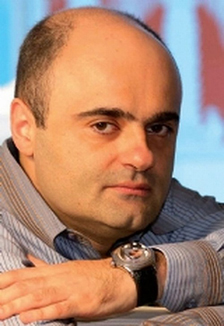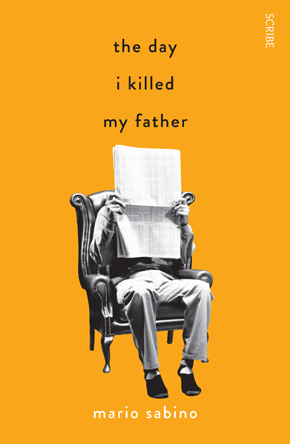Murder symptoms
by Mario SabinoI dreamt last night that I was a child and alone at home, feeling sick. I kept on vomiting, and there was no one to help me. Distressing. I did actually find myself in this situation several times, after my mother died. Domestics never lasted more than a year at our place – my father fired them before they got to know us too well. As a result, I was always in the company of strangers who didn’t really care whether I was
OK or not. They’d do their work, then disappear into the back shed in the afternoons, and they’d only come out to answer the door or fix an afternoon snack… My routine?
I’d go to school in the morning, get home at lunchtime, eat alone, do my homework, watch TV, have afternoon tea alone, go for a swim in the pool, have a shower (I often didn’t bother, since no one kept tabs), eat dinner alone, watch more TV, and, when I heard my dad arriving, run to my room to pretend to be asleep. And I would end up falling asleep, obviously.
Whenever I was sick, like in my dream, it was our driver who came to my aid. But he wasn’t always at home, since my father used his services a lot. My pre-adolescence was very solitary, as was my adolescence… Yes, my father took me to doctors about my dizzy spells. They ran a series of tests, which detected nothing. The diagnosis was “neurovegetative disorder”, a name that doctors use when they don’t know what the problem is. Since they assured my father that I wasn’t going to die from it, he stopped worrying about my crises. I could miss a week of school, and he wouldn’t care. He’d go off to work and out on the town, regardless. The only difference on these occasions was that he’d allow his driver to put his other tasks aside and keep me company.
Did I have friends at school? It’s not that I didn’t, but I was never able to truly be a friend. Every now and then, someone would invite themselves over to my place after school. When this happened, I’d change the subject, or I’d tell them that the pool was being renovated, or that I had a doctor’s appointment. Stuff like that. It’s hard to explain. I didn’t like being alone but, at the same time, I was used to solitude. It seemed to be my natural state… Weekends? Well, when my father was out of town, and he was gone a lot, I’d keep to the same routine as every other day. When he was in town, we’d go to the country club. He’d spend the whole time drinking whisky with his friends, while I’d wander from one group of kids to the next, without settling into any of them.
No, my father had no family. I mean, he did, but he didn’t like having contact with them. He came from humble origins, and was irked by the fact that his relatives hadn’t broken out of the poverty cycle which had scarred him in his childhood. Actually, when I say relatives, I’m referring to cousins, aunts and uncles. Both sets of grandparents, on my father and mother’s side, died before I was born; and his only brother, who was younger than him, had gone off to Australia without a trace. This uncle once tried to re-establish contact by phone, but my father had chased him off with swear words, according to the driver, who’d witnessed the scene…
My mother’s sister? Well, like I said, she lives abroad. She’s lived in several places: New York, Paris, Milan. She went because her husband, an executive with a multinational, was transferred around a lot. After he died, she moved to a small municipality an hour out of Rome, in the mountains – Anticoli Corrado. It’s very popular among sculptors and painters. This aunt of mine always had artistic inclinations. She makes etchings; some are interesting. Occasionally, she sends letters – which I don’t answer – and tries to get me on the phone, but I don’t take her calls. She feels a bit guilty for everything that’s happened… I could talk to her, I know, but the price I’ve imposed on myself is high. That’s the way it has to be.
***
When my mother was still alive, I read to acquire enough knowledge to impress her and humiliate my father. When she died, I abandoned my books for a good while. I only went back to them when I was about fourteen. I think I started reading again because it was a more efficient way to pass the time. I read so voraciously that, instead of toys and junk food, I used my hefty allowance to buy books. My father always gave me a lot of money. Not out of generosity, but insouciance. It was a way of saying, To hell with it. Let him look after himself. I had to start my collection almost from scratch, since one of the first things my father did when my mother died was donate most of her books to a charity – just as he did her clothes, jewellery, and all her other belongings. Even her photographs ended up with my aunt. I got them back as an adult, and keep them in the cupboard I have here.
I spent my adolescence reading – not least because it irritated my father, who blamed it for the fact that I’d turned into a skinny, pale teenager. At the country club, he couldn’t hide his envy of his friends who had strong, suntanned sons who’d already had a string of girlfriends, and who engaged in vile banter. To further set myself apart from them, I opened my mouth only to say that the days of the bourgeoisie were numbered, and that the only thing worse than robbing a bank was founding a bank. Not that I was some snot-nosed wannabe communist. I’d read the Communist Manifesto, and other nonsense of that sort, just to have ammunition when I wanted to provoke my father and his rich friends. It was more or less like wearing torn trousers and dirty T-shirts, which I also did.
Concerned that I wasn’t like the idiots he considered models of healthy youth, my father decided to, in his words, “help me become a man”. He started bringing up smutty subjects, and one night dragged me off to a “special restaurant” – an upmarket brothel. “Take your pick, and I’ll pay,” he said, showing me the girls. To get out of it, I pretended I was dizzy, really dizzy, and that I’d faint if I stayed. My father obviously didn’t fall for it. He only agreed to leave because he didn’t want to risk becoming a supporting actor in a ridiculous fainting scene. On the way home, he hurled insults at me. He said I was a poof, abnormal, sick, and that he’d never go out in public with me again. Not even to the country club.
It’s possible to compose beautiful symphonies overflowing with the purest joy, and to paint magnificent canvasses in which radiant morning light is the only protagonist. But there is no great book whose main subject is not unhappiness”
To my immense satisfaction, he kept his word. We only went out together again when I started seeing the woman I eventually married… How old was I when I lost my virginity? It was after my father tried to initiate me – I was about seventeen and a half. I went by myself to a downtown brothel. The whore I chose had a broken arm, and after we had sex, to complete the hour I’d paid for, she started telling me a weird story. She said that where she came from, there were women who gave birth to children who were half human, half animal. She must have been crazy.
Coming back to my reading… I read so much that it affected my performance at school. I neglected my studies to concentrate on novels, short stories and plays – some of them impenetrable to a teenager… Did my books make me happy in any way? On the contrary, they helped me to become even unhappier. But it was a special unhappiness; that of one who believes himself better than others. Turning to books to make oneself feel especially unhappy – there’s nothing uncommon about that. I’d even go so far as to say that it makes the most sense. I don’t want to dwell much on this, because it’s not our topic. I’d just like to say one thing: I think literature confirms human unhappiness for those who are already prone to it. Or, at least, it shows how limited happiness can be. It’s possible to compose beautiful symphonies overflowing with the purest joy, and to paint magnificent canvasses in which radiant morning light is the only protagonist. But there is no great book whose main subject is not unhappiness… Why is that? Because one must be unhappy, in essence, to write a book, and to seek, in the interregnum of writing, some happiness. Clarice Lispector, remember? And me.
The ironic thing is that, because of my devotion to books, I ended up living the illusion that I could be happy full-time. It is an indirect association, but it can be made. They – books – led me to the place where I was to meet my wife… No, I don’t think the expression ‘ex-wife’ is more appropriate. It’s true that we live far apart, but on paper we’re still married. From a legal point of view, it was the best way our lawyers could find for me to continue to avail myself of a share of my father’s fortune, which is now limited to the payment of my monthly fees here. As I’m sure you know, I lost all right to any direct inheritance when I murdered him.
I can, therefore, call her my wife. And I will do so until the end of my days.
Extracted from The Day I Killed My Father, translated by Alison Entrekin.
 Mario Sabino was born in São Paulo in 1962. He is deputy managing editor of Veja, Brazil’s most influential weekly magazine. The Day I Killed My Father (O dia em que matei meu pai) was first published in Brazil by Record in 2004. His second book, a collection of short stories, O Antinarciso (The Anti-Narcissist), won the Brazilian National Library’s Clarice Lispector Award. He has completed his second collection of short stories, A boca da verdade (The Mouth of Truth), and is currently working on his second novel, entitled O vício do amor (Addicted to Love). The Day I Killed My Father, a novel that is part psychological thriller, part intellectual puzzle, is published by Scribe. Read more.
Mario Sabino was born in São Paulo in 1962. He is deputy managing editor of Veja, Brazil’s most influential weekly magazine. The Day I Killed My Father (O dia em que matei meu pai) was first published in Brazil by Record in 2004. His second book, a collection of short stories, O Antinarciso (The Anti-Narcissist), won the Brazilian National Library’s Clarice Lispector Award. He has completed his second collection of short stories, A boca da verdade (The Mouth of Truth), and is currently working on his second novel, entitled O vício do amor (Addicted to Love). The Day I Killed My Father, a novel that is part psychological thriller, part intellectual puzzle, is published by Scribe. Read more.
Alison Entrekin has translated a number of works by Brazilian and Portuguese authors into English, including City of God by Paulo Lins, The Eternal Son by Cristovão Tezza, Near to the Wild Heart by Clarice Lispector, Budapest by Chico Buarque and Crow Blue by Adriana Lisboa. Originally from Australia, she now lives in Brazil.


